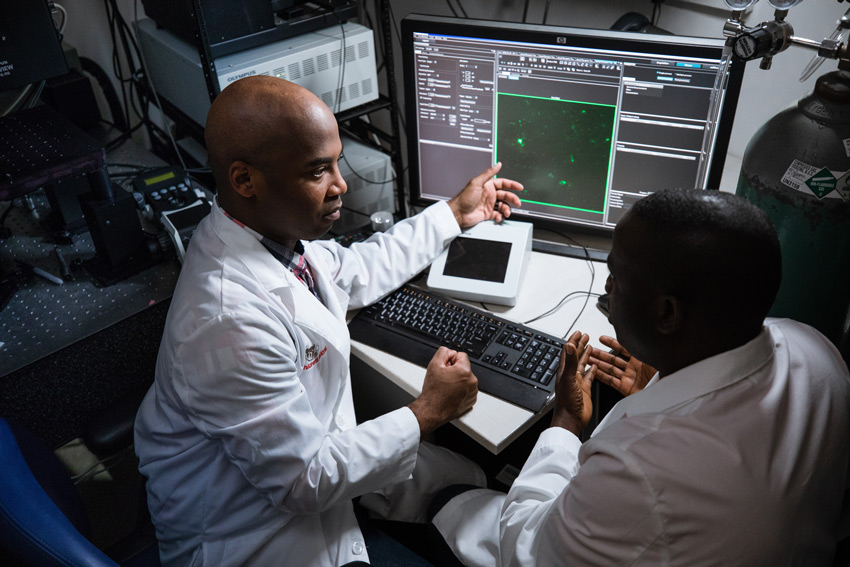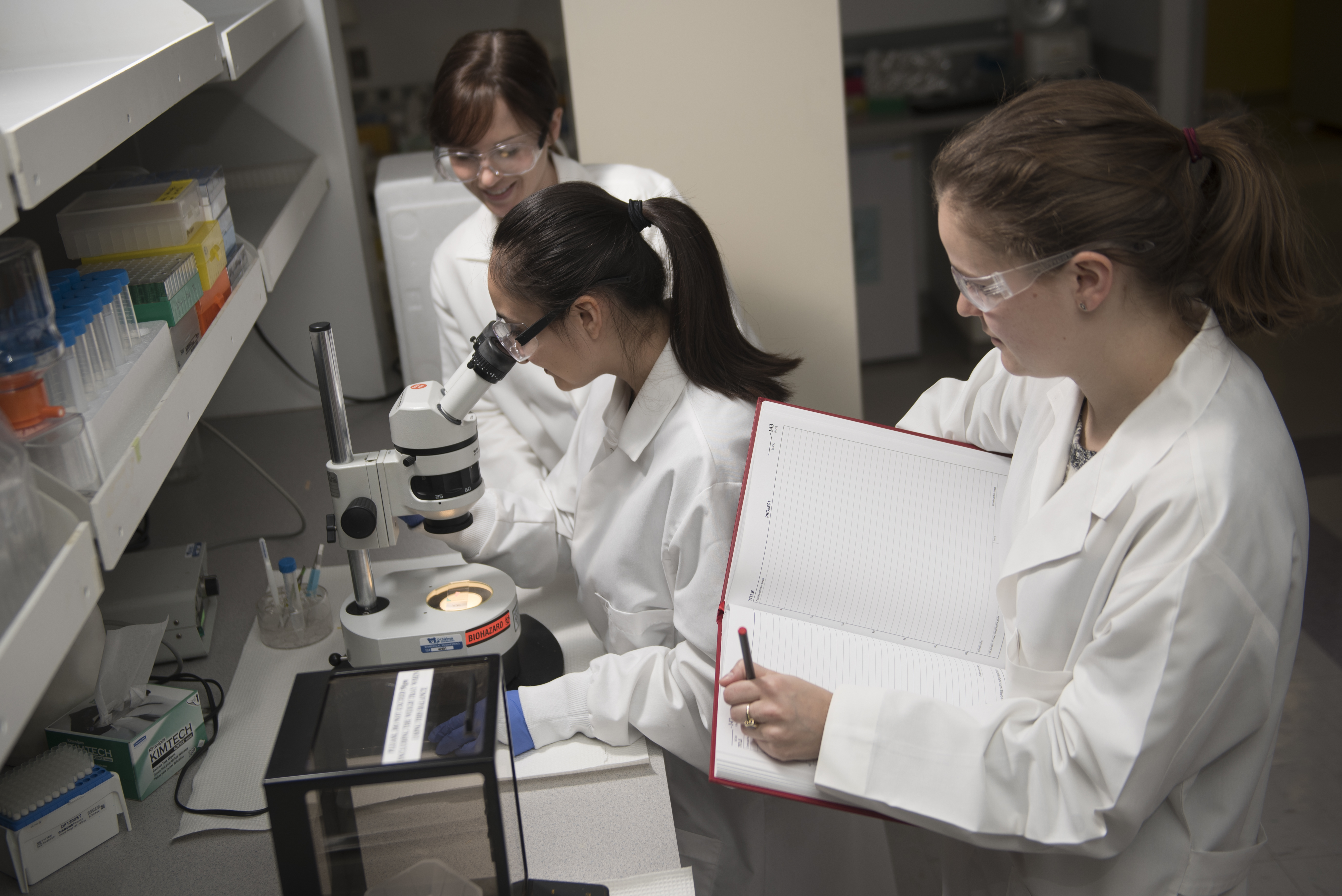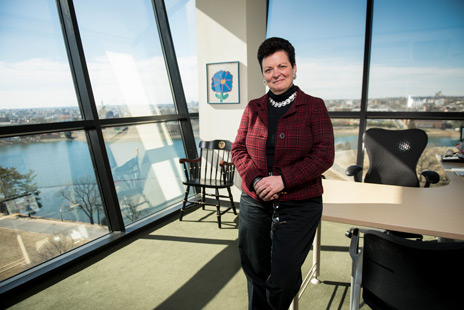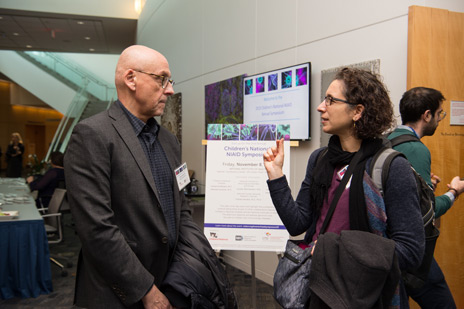Children’s National Research Institute Academic Annual report 2019-2020

Center for Neuroscience Research
A Global Destination for Training and Mentorship in Neuroscience
A research institute deeply integrated into the infrastructure of a pediatric hospital creates a unique set of opportunities for scientists and clinicians to work together on pressing problems in children’s health.
It also creates a unique learning environment for research and clinical trainees and can offer a special blend of both worlds to clinician-scientists — the investigators who hope to see the world as both.
For the past 18 years, Vittorio Gallo, Ph.D., now chief research officer for the entire institution, led the Center for Neuroscience Research at Children’s National Hospital. As center director, education and training for scientists and clinician-scientists became a priority for him and his faculty, with a special focus on high-quality mentor-mentee relationships for aspiring and established investigators of all educational levels and diverse backgrounds.
“There’s quantitative data clearly showing that investigators who have good mentors and an effective training perform better throughout their careers,” Dr. Gallo said. “In the Center for Neuroscience, we’ve seen that establishing a pipeline of mentees and connecting them with strong mentors early in their careers helps them find greater success at securing research funding, performing important research and becoming mentors themselves down the line.”
Building Trainee Infrastructure in the Lab
Joshua Corbin, Ph.D., a full professor and senior faculty member, and Jason Triplett, Ph.D., an associate professor and co-director of the Neuroscience track at George Washington University Institute of Biomedical Sciences (IBS) Graduate Program, oversee the center’s trainee experience — which, during the academic year, involves between 35 and 40 lab-based trainees, including both graduate students and postdoctoral fellows. That number increases significantly in the summer, when the center also welcomes high school, undergraduate and medical school students into the labs.
To make certain that mentorship and training opportunities are sustainable over the long term, Drs. Corbin and Triplett have worked with center faculty to create a formal structure that engages trainees and enhances their experience, including:
Regular, established learning opportunities, such as roundtable talks with faculty and other guest speakers, invitations to attend faculty meetings and career development workshops.
Access to structured funding mechanisms for trainees, including identifying opportunities for trainees to secure training awards (NIH or foundations) or adding trainees as supplements to existing NIH grants.
Official channels to engage in two-way conversations about trainees’ needs, including a group called Students and Postdocs in Neuroscience (SPiN), who meet regularly, collect feedback and then speak monthly with center leadership about pressing issues and concerns from the trainee perspective.
We take mentoring seriously — not only for the tangible benefits of helping trainees conduct good science but also because it’s our job to pass on the knowledge we’ve gained from others who passed it on to us."
“We see mentorship, support and training as a large part of our jobs and what we do every day,” said Dr. Corbin, who has mentored at least 30 trainees in his career. “We take mentoring seriously—not only for the tangible benefits of helping trainees conduct good science but also because it’s our job to pass on the knowledge we’ve gained from others who passed it on to us.”
“The job of being a scientist is large and complex,” added Dr. Triplett. “It’s important to learn a lot about the career of science and what it entails outside of doing research.”

Neurosciences Research Training and Mentorship in the Clinic and Beyond
William Gaillard, M.D., associate director of the Center for Neuroscience Research and chief of child neurology and epilepsy at Children’s National, pointed out that research — whether basic, translational or clinical — is also tightly integrated into the training of aspiring clinical neurologists of all disciplines, including neuropsychology, neurosurgery, psychology and neurogenetics. Training also includes other disciplines that directly interface with the neurosciences, such as neonatology, critical care and cardiovascular surgery.
“Those who come here for clinical training are all exposed to some modicum of research,” he noted. “Everyone is encouraged to develop a research project defined by their interests, and many residents and fellows are given the opportunity to conduct this type of work during elective time.”
In clinical neuropsychology, for example, trainees — including postdoctoral fellows, graduate students, undergraduate and high school interns — engage in clinical research in which the studies are directly applicable to relevant clinical work, such as intervention studies and studies with clinical populations who have intellectual and developmental disabilities. Under the direction of Madison Berl, Ph.D., a board-certified pediatric neuropsychologist and associate professor who serves as research director for neuropsychology, trainees attend monthly divisional research meetings to learn about conducting research, including ethical conduct, policy changes internally and externally, new statistical techniques and other relevant research skills.
“A valuable lesson that our research trainees learn is that collaboration is critical to all successful research because it occurs at several levels, from community engagement to interdisciplinary expertise to administrative tasks,” said Dr. Berl. “A successful investigator needs to communicate differently — but just as effectively — with the family who is distrustful of being in a study, a colleague who has never worked with a population, and the person that creates a grant budget.”
Similar programs marrying research with clinical learning exist throughout the neuroscience disciplines, including clinical neurogenetics, neurosurgery, psychology, neuro-oncology and neurology. Dr. Gaillard also noted that many neuroscience clinical fellows are part of fellowships that include a research component. He estimated that about one-third of fellows will dedicate substantial time during their final year of training to develop research that sets the stage for a grant application to support further work after the fellowship is completed.
Dr. Gaillard sees the two as inseparable. “Everything we do should be geared toward learning more about the disease and identifying new treatments for these diseases. I can’t imagine doing it any other way.”
Everything we do should be geared toward learning more about the disease and identifying new treatments for these diseases. I can’t imagine doing it any other way."
The center also emphasizes the connections between the care provided in the hospital and the research going on within the laboratories through research mentorship. Center faculty, including Dr. Gallo, routinely serve as mentors for clinician-scientists in addition to laboratory-focused trainees.
“Clinical experience can help tell basic scientists what’s important to study based on the challenges they see in patients,” said Michael Bell, M.D., who is chief of the Division of Critical Care Medicine at Children’s National but also has spent 10 years as a principal investigator in the Center for Neuroscience Research studying cell injury and cell death mechanisms. “Basic scientists are able to develop a laboratory model of injury frequently seen in clinical settings and figure out the hard lessons that clinicians need to learn via preclinical models,” he noted.
That cross-communication and interaction between investigators with clinical research and those with basic science expertise is one of the hallmarks of Children’s National’s educational program for both clinical and basic science trainees. Many investigators in the Center for Neuroscience Research and in other research centers at Children’s National are physician-scientists — including several clinical division chiefs, such as Dr. Bell. Regardless of an investigator’s interest or prior training, Dr. Bell — who has mentored more than 35 fellows, medical students and other trainees — noted that establishing an effective mentoring relationship involves one key challenge. “Finding the right match between mentor and mentee is the most important part. It isn’t just based on scientific qualifications; it needs to be a relationship between two people who have clear goals and expectations and can work effectively together.”
“A good mentor is rewarded by other people’s success and is reliable and consistently there for the mentee, working with him or her to devise the strategies that work best for the individual to succeed,” said Dr. Gallo, who also emphasized that people at every stage of their careers, even the most senior faculty member, can benefit from mentorship.
The Center for Neuroscience Research’s focus on developing support and mentorship mechanisms is one example in Children’s National Research Institute of the entire organization’s dedication to providing high-quality educational experiences for all trainees.
The institution also offers a number of unique internal research awards designed to support those who take an active role as mentor, mentee or both. These NIH- and institutional-funded awards include mentored research awards, grants enhancement programs, a KL2 award for mentored faculty and junior faculty in our Clinical and Translational Science Institute and a K12 Child Health Research Career Development Award for pediatricians who also conduct lab-based or clinical research.
High-quality structured training opportunities and emphasis on the best possible mentorship experiences across the span of an investigator’s career has set the institution apart as a premiere place to conduct research. Children’s National has become a sought-after training destination for both scientists and clinicians around the globe, according to Dr. Gallo. “The fact that we provide good mentorship and focus on collaboration has attracted high-quality trainees at all levels — from students to postdocs to new investigators. We believe our success depends on collective success, not competition with each other.”

